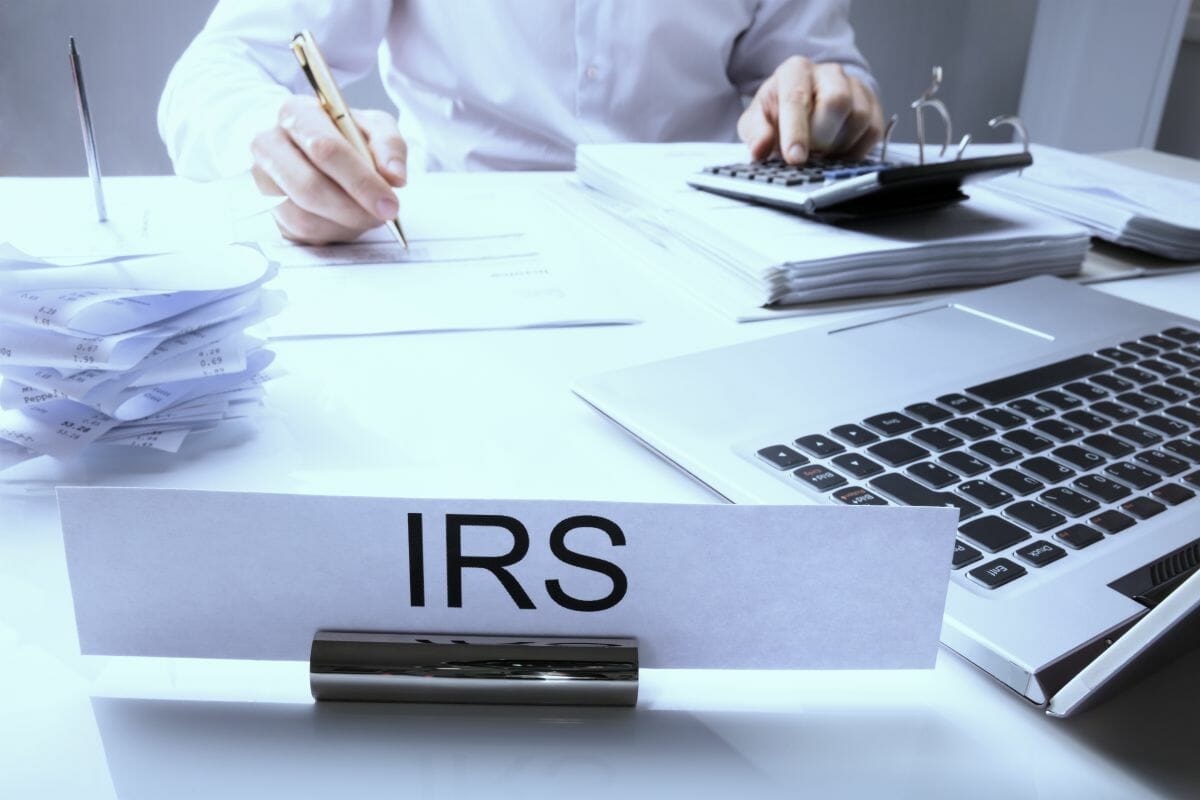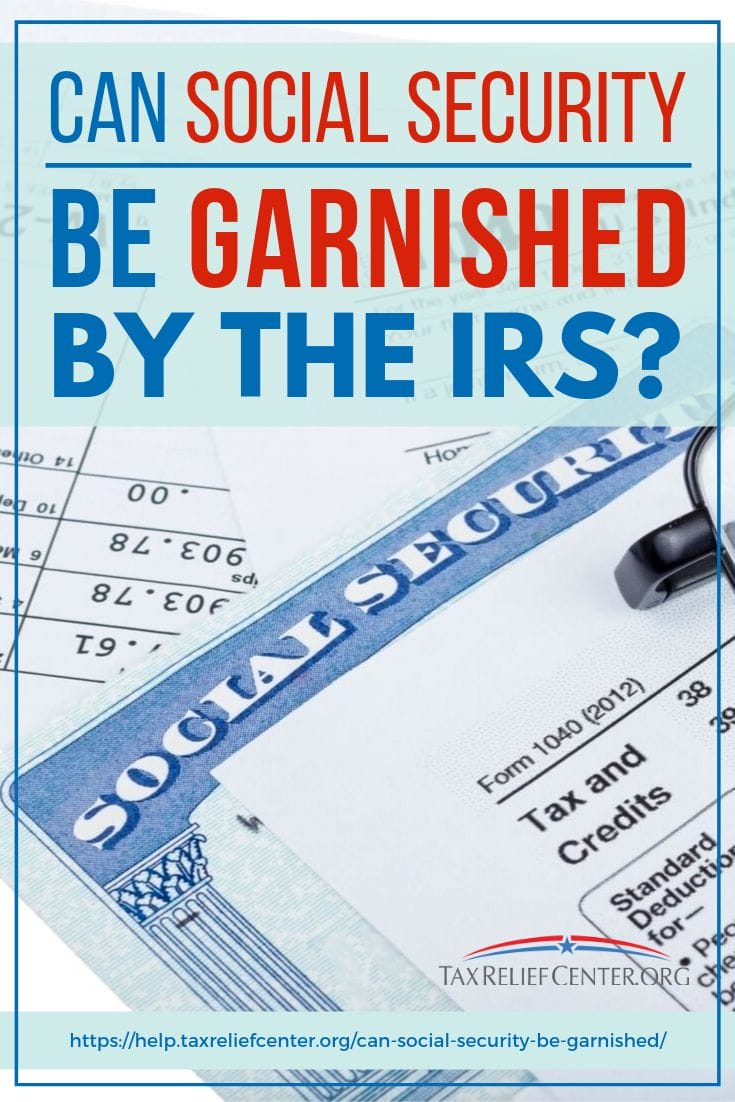Knowing the answers to questions such as “Can social security be garnished by the IRS?” is essential to the retired taxpayer in debt.
RELATED: A Step-By-Step Guide To Settling IRS Tax Debt
In this article:
- What Exactly Is Social Security Garnishment?
- Can a Private Creditor Take My Social Security?
- Can the IRS Garnish Social Security?
- What Are Other Assets and Benefits That the IRS Cannot Levy?
- Other Than the IRS, Who Can Garnish Social Security?
- What Is the Process for Social Security Garnishment?
- What Can I Do to Stop or Postpone the Garnishment?
“Can Social Security Be Garnished By The IRS?” and Other Crucial Taxpayer Concerns
What Exactly Is Social Security Garnishment?
Garnishment happens when the courts allow a creditor to collect a part of the debtor’s income to pay the debt. The law does provide protection for the debtor in the form of limiting how much the creditor can take, and from what source of income.
Debtors who are delinquent in paying debts can have wages garnished or assets levied.
For example, the government prevents private creditors and even states from collecting debt from social security. However, wages and income from assets generating revenue can become subject to garnishment.
Another crucial point that taxpayers need to know lies in notification. The court, as well as the creditor, has to notify the debtor that their wages, assets, or income:
- Will now have part automatically collected to pay their debts,
- The schedule of debt collection,
- The proportion and numerical amount of garnishment.
Traditionally, welfare benefits like social security had the privilege of being exempt from garnishment. However, recent developments, particularly higher state and federal expenses, have canceled the IRS garnishment of social security benefit. As of February 2002, the IRS can now levy social security for tax debt.
Can a Private Creditor Take My Social Security?
Currently, the answer is no, as the law prohibits social security garnishment. Private entities cannot ask the court to garnish a part of the social security income of retirees.
However, there are a few loopholes available to private entities.
Social security funds deposited to the bank directly have the protection afforded by law and enjoy exemption from garnishment. However, creditors can freeze social security funds that move from one bank account to another, through a court order.
The law states that money coming from Social Security cannot undergo garnishment. However, once the payout has been moved from one bank account to another bank account, the origin of the funds has changed, canceling the protection granted by the law.
Can the IRS Garnish Social Security?

For tax debts from February 2002 onwards, the IRS can garnish social security income. The cap for social security garnishment is 15%.
It is important for retirees to know that there are major changes to the law.
For example, the 1996 Debt Collection Improvement Act makes the first $750 of social security untouchable.
However, the 2000 Federal Payment Levy Program empowered the IRS to collect tax debt from social security payments. The assured $750 applies for most kinds of garnishment, but does not apply when federal taxes are in the equation.
Which means that retirees who are also in debt before the year 2000 may have grown accustomed to the assured $750. This belief can lead to penalties, especially if a tax mistake is just recently discovered and has not passed the Statute of Limitations (10 years).
Typically, the first $750 enjoys protection from any kind of garnishment, but the IRS can now levy 15% on the whole amount. To make it clearer, the garnishment is the total monthly social security income multiplied by .15, or 15%.
However, supplemental security income cannot have any attached garnishment under any circumstance.
What Are Other Assets and Benefits That the IRS Cannot Levy?
The IRS cannot seize the domicile or primary residence of the taxpayer. The main purpose of this prohibition is to protect taxpayers from homelessness.
Taxpayers can also ask that the primary vehicle for going to and from work, school, or home be exempt.
Assets that no one will buy or cannot be auctioned are also exempt.
The law also protects the taxpayer from having their workers’ compensation garnished.
Also, books and other equipment and tools necessary for studying or working enjoy protection from the IRS levy.
Taxpayers with a tax debt to the IRS may want to know what the IRS cannot seize or levy. Also, knowledge of what assets the IRS commonly levy can help taxpayers plan possible strategies to minimize tax debt expenses.
RELATED: 10 Assets That Can Be Put Under An IRS Levy
Other Than the IRS, Who Can Garnish Social Security?
Taxpayers with unpaid federal students loans may have part of their social security set aside to pay off their college debt.
Also, the courts can garnish social security income for the payment of child support and alimony.
If the court has convicted the taxpayer of a crime, payments for victim restitution can get funding from the Social Security payments.
Generally, any federal debt can constitute as a legal cause for social security garnishment.
However, the law does protect the taxpayer-debtor by ensuring that the taxpayer receives at least $750. This exemption does not protect the funds from federal taxes, hence why the IRS can apply 15% to the whole social security income.
What Is the Process for Social Security Garnishment?

The IRS social security garnishment follows after the IRS tax levy process.
Taxpayers receive a notice first about unpaid and unfiled taxes. If the IRS did not receive any response, the IRS sends a second notice, demand letter, and a filled-out tax report generated by the IRS.
The debtor-taxpayer then receives a Notice to Levy, with the Right to Appeal following. Lastly, the IRS then sends a CP 91 or CP 298, which functions as the final notice before the IRS proceeds to collect the tax debt from whatever assets the taxpayer has on hand.
Non-payment will result in the garnishment of social security benefits of 15% until the satisfaction of the debt. Since the reason for garnishment relates to federal taxes, the taxpayer will have a 15% levy applied to the whole social security paycheck, rather than have an assured $750.
Also, the IRS does not need to go to court for the garnishment, as they can just send the collection notice to the bank where the social security benefits come in.
Lastly, welfare benefits categorized as Supplemental Security Income cannot be garnished. The Supplemental Security Income relates to the benefits provided to the disabled, blind, or usually those over 65 years old.
Supplemental income maximum levels to qualify for supplemental income is $771 for single taxpayers and $1,157 for couples.
What Can I Do to Stop or Postpone the Garnishment?
The first option is to pay back the whole debt. Getting a bank loan or disposing of a few assets may be ideal, compared to having wages and benefits garnished.
Negotiating for an installment plan can also give taxpayers more breathing room and flexibility in their budgeting. Usually, an installment plan can go from a year to five years, and all fees associated with the debt are on hold for the duration of the installment plan.
Taxpayers can also try an Offer In Compromise. In this application, taxpayers can ask for assistance from the IRS by lowering the tax amount and halting the imposition of penalties.
Lastly, applying for a Currently Not Collectible (CNC) status can help debtors get back on their feet financially. The IRS puts both the fees and the unpaid tax debt on hold for a period of time, although the IRS does not always grant a CNC application.
Can social security be garnished by the IRS? Yes, but knowledge of the process and other crucial information can help debtors avoid unnecessary cost and headaches.
What are your thoughts about social security garnishment? Do you know someone who has experienced the process?
If you owe back taxes, visit taxreliefcenter.org for more information on tax relief options.
Up Next:
- What Is A Standard Tax Deduction
- Tax Relief For Deserving Americans | Do You Qualify
- Tax Debt Consolidation As A Solution


